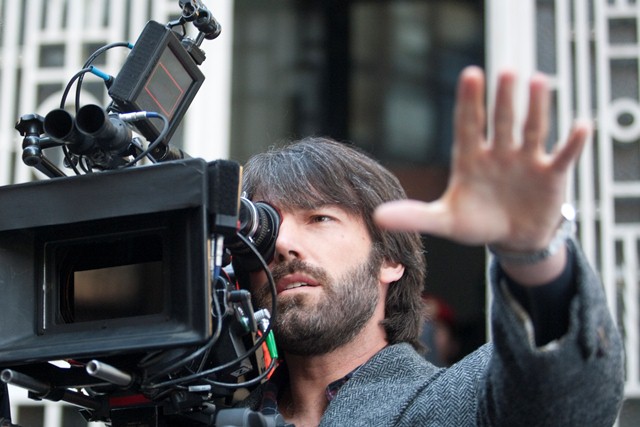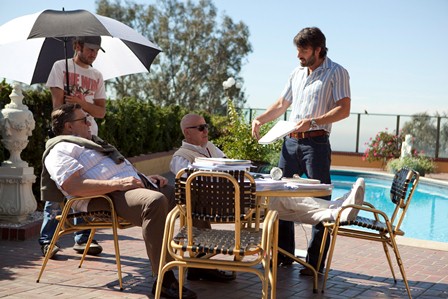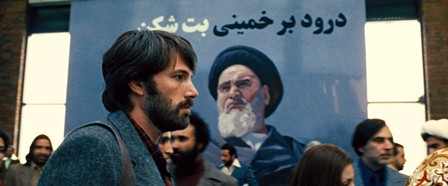CHICAGO – In anticipation of the scariest week of the year, HollywoodChicago.com launches its 2024 Movie Gifts series, which will suggest DVDs and collections for holiday giving.
Interview: Ben Affleck Brings Stunning Story of ‘Argo’ to Life
CHICAGO – Ben Affleck is such a nice, likable guy that he asks those interviewing him how they’re doing and expresses how much he loves Chicago before you can even get a question out. He has reason to be happy. He’s riding a wave of incredible praise for his amazing “Argo,” the best film of the year to date and a surefire player at this year’s Oscars (come back Thursday for our full review).
Ben recently sat down with HollywoodChicago.com, Ain’t It Cool News, and WIND-Hollywood 360 and the conversation veered from the responsibility of recreating to true stories to what he’s learned from working with directors like Kevin Smith & Gus Van Sant to whether or not he was ever really attached to “Justice League.”
HOLLYWOODCHICAGO.COM: How did Toronto go?
BEN AFFLECK: Great. We really had a great screening. And you know there’s a little bit of hometown love in there, so we definitely got some appreciation. And there’s definitely Canadian jokes to, not at the expense of Canada, but jokes that Canadians would get that kind of fall flat in the U.S. and it got big laughs at the premiere. [Laughs] So it was a nice boost, and we’re excited to come out here. We did Boston and now here and then I’ll go to St. Sebastian [Film Festival], then I’ll come back and do San Francisco and then New York and L.A., and finally the movie will come out at some point. [Laughs]
HOLLYWOODCHICAGO.COM: I read an interview in Toronto where you said that Warner Brothers took a chance on you, because “there were a lot of elements in this movie that could trip you up.” What were those elements?
AFFLECK: Well for one thing, there are a lot of elements in terms of tone that are hard to synthesize. There’s the comedy, the suspense, the heavy Washington stuff that don’t really lend themselves to being woven together easily. Also I think in terms of marketing the movie, there are a couple of ways to look at it, one would be “No one wants to have a Middle East war movie.” That’s thought to be the kiss of death marketing-wise, and nobody wants to have period drama, but to me this is like comedy, thriller, and satire. So you’ve got to position it in the right way and tell people what’s in there rather than relying on them to make guesses about it.

Argo
Photo credit: Warner Bros. Pictures
AIN’T IT COOL NEWS: Along those lines, you have all of these different storylines and threads that really run the risk of complicating things. Is what we see in the film the way it was in the script? Or did you have to come in and organize it a little more?
AFFLECK: Yeah, it was in the script to a certain extent. It’s one of the things I worked on when I came on board with Chris [Terrio, screenwriter], practically, how we were going to do it and how much of it we were going to do and dialing up and down the comedy. He actually trusted the comedy more than I did and he proved right, that the movie could take more jokes and still be okay to rebound back into reality back in Iran. It was a fun one to work on, because there were all these facets and so many knobs to turn. It’s not like one storyline where you can go, “Okay, I know what this is and we’re going to run the ball right up the middle.” It had a lot going on.
 Argo Photo credit: Warner Bros. Pictures |
WIND: I read that you had studied Middle Eastern cultures in college. Is that what drew you to the script?
AFFLECK: That was a big part of it, yeah. Middle Eastern studies was something I was really interested in, but I did drop out, technically. [Laughs] But I studied it before I dropped out and I really liked it. It’s a part of the world that I find mysterious and unknowable, and I could tell then that it was important to us and since then it’s been more important to us now, obviously. So the mysteries of that and trying to unveil some of those for an audience was a really interesting prospect.
AIN’T IT COOL NEWS: Did you ever write about the Iranian Revolution when you were in college?
AFFLECK: Yeah, I did two papers on the revolution. I was really more focused on the Arab world. Of course Iranians are Persian, but the revolution itself was seen as a seminal event, but like a one off event when I wrote those papers. It was like “And here is this unusual thing that happened.” Now revolution and the unintended consequences of revolution is on the newspaper every day and has been for years with Egypt, Tunisia, Syria now. It’s an incredibly relevant idea.
HOLLYWOODCHICAGO.COM: When you see those scenes of revolution, it’s hard not to think of Egypt and Syria and those other things that are going on. How much fictional license did you take, and how much fictional license do you think you should be allowed to take with a story like this?
AFFLECK: I think you should be allowed to take as much as doesn’t corrupt the essence of the story, which is six Americans trapped in Iran, the CIA came up with an idea for a movie cover, went over there, Tony Mendez rescued them, and brought them home. That’s all true and that’s completely legit. Now we do a lot more things that are true than that, but I would say that would be the barometer.
So we had Tony with us the whole time. Obviously, we read his book and there’s documentary. I sat down with him and heard the stories from him, and he was on the set and he was in Toronto two days ago and really happy with the movie. So that’s the truth. Things that we changed are things were like the house guests were broken up and staying in two places for a period of time. It’s like, “Is that really relevant to the truth of the story? Or does it just create more shoe leather?”
But those tensions are what you deal with when you try to make a true story. The car didn’t chase them down the runway at the end, but they were freaked out, and their plane was delayed and had mechanical troubles, so they were sitting there with their pulses pounding, but it wasn’t because [they were about to get caught]. We externalized that internal drama. I think the proof in the pudding how four of the house guests that were there were with us on set, and we had Tony. So we knew we had our barometer with us.
 Argo Photo credit: Warner Bros. Pictures |
AIN’T IT COOL NEWS: In terms of your cast, you have slightly lesser-known people playing the house guests, at least compared to some of the other actors you have in the movie. Someone like John Goodman or Alan Arkin bring a certain baggage that you can use to your advantage in a lot of ways. Did you deliberately try to put these lesser-known actors, who look amazingly like the real people—you put those pictures up at the end and it’s kind of unbelievable…
AFFLECK: I had to put those pictures up, otherwise no one would believe someone wore glasses like that. [Laughs]
AIN’T IT COOL NEWS: I didn’t recognize Rory Cochrane until the end of the movie. Did you deliberately cast people that wouldn’t bring a lot of baggage with them and would be almost unrecognizable?
AFFLECK: Yeah, the idea was to get people that you didn’t know—or if you did know them, cover them up in the veil of their disguise as this person. I think the theory behind it for me was, “The audience needs to identify with these people. The movie wont work if you’re not with them, thinking that could be you.” And the more famous somebody is, the more you know that bad things don’t happen to them.
I love watching Matt [Damon], but by the third BOURNE movie, I know that he’s going to kick everyone’s ass, and that’s a different kind of movie because it’s a different kind of suspense that’s like, “Watch how cool he can do this.” Hopefully with this, you think “These guys might not get out of this.” So the more anonymous an actor you find or the more anonymous characters you make, the more I think the audience is inclined to worry about their fate.
WIND: I’m actually old enough to know what it was like to be here. My yellow ribbons on my trees actually grew into the trees after 444 days. It really did touch America and I feel that you really did achieve that. You nailed it in this film. What resources did you use?
 Argo Photo credit: Warner Bros. Pictures |
AFFLECK: The nice thing is that era is the very first beginning of the period when we started keeping all of these archives and records. So I could get the stuff off the TV stations, I could get every broadcast in the news, and they weren’t 24 hours either, it was two or three hours of news every day. “Nightline” started then with AMERICA HELD HOSTAGE it was called, and they started keeping track of it, and the show was so popular, they just stayed with it. And there was pretty decent photography that we could use that showed us down to the shirt, the glasses, the shoes, even the mustache, in reproducing factual events. So that was the real asset.
In fact, I was so enamored with all of the research, that I put a lot of the historic footage in the movie and then even at the end I used those images from history. It just struck me that it was amazing that it was recent enough that we could copy it so closely, and it also reinforced the fact that it’s true. You hear the president of the United States at the time at the end of the movie talking about the mission, that’s true.


